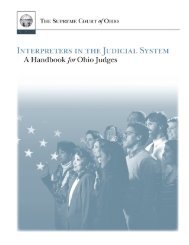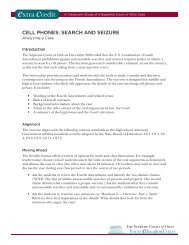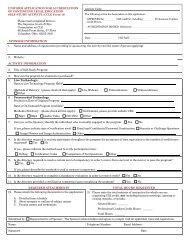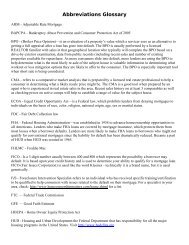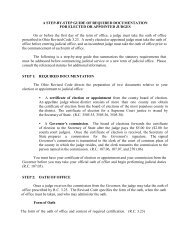Planning for Parenting Time: Ohio's Guide for Parents Living Apart
Planning for Parenting Time: Ohio's Guide for Parents Living Apart
Planning for Parenting Time: Ohio's Guide for Parents Living Apart
You also want an ePaper? Increase the reach of your titles
YUMPU automatically turns print PDFs into web optimized ePapers that Google loves.
Long-Distance <strong>Parenting</strong> and Relocation<br />
GENERAL TIPS<br />
AIR TRAVEL<br />
Ideally, a child younger than eight should not travel alone. If it is<br />
necessary <strong>for</strong> a child to travel by air, direct flights between major cities<br />
are preferred over multiple stops or plane changes. To save costs, tickets<br />
should be priced at a 30-day advance notice, economy class and using<br />
major carriers. Consult each airline <strong>for</strong> how and when unaccompanied or<br />
monitored minors may fly. Remember that if a person younger than 18 is<br />
traveling in the United States alone or with only one parent or another<br />
adult, a court order or certified consent letter proving that both parents<br />
permit the trip should be carried.<br />
DELAYS AT EXCHANGE POINTS<br />
Communication is never more important than when a long-distance<br />
exchange occurs. Keep your contact numbers current and notify each<br />
other of the safe arrival of your child. Also, be sure to keep each other<br />
in<strong>for</strong>med of any un<strong>for</strong>eseen delays as soon as possible. Discuss in<br />
advance what a reasonable waiting time is <strong>for</strong> each means of<br />
transportation.<br />
DROP-IN VISITS<br />
Opportunities can occur <strong>for</strong> either parent to be in town when the children<br />
are in the care of the other parent. When such opportunities arise, parents<br />
should be flexible and set aside normal routines to allow contact on short<br />
notice. A lot of good faith can arise from such cooperation. Remember,<br />
the shoe may be on the other foot someday.<br />
FREQUENT MOVES<br />
Families benefit from financial stability in their lives. It also is a fact that<br />
the average U.S. family moves every five years. Typical reasons include<br />
jobs, health, education, marriage and family emergencies. However,<br />
when either parent moves frequently and without good reason, that<br />
parent can expect to bear the burden of the move and pay more <strong>for</strong> the<br />
costs and travel time of parenting.<br />
63




